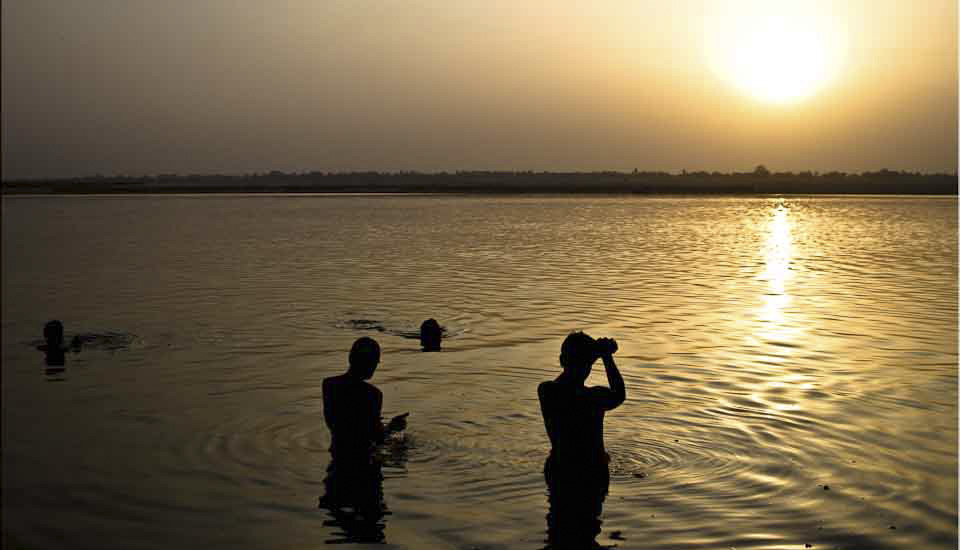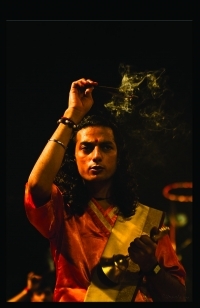.jpg)
Ritual Flames
Varanasi is an ancient and sacred city imbued with religious symbolism. At the holy Dasaswamedh Ghat, young priests perform the Ganga aarti every evening at sunset.
It is said that Lord Shiva, one of the Trimurti, the Hindu trinity, created the city of Kashi (Varanasi) with his hands. That is why Varanasi, one of India’s seven holy cities, is said to be the country’s spiritual capital.
The holiest parts of this sacred city are along the ghats – the stairs – leading down to Ganges, the river known in India as the goddess Ganga Ma or “Mother Ganges.”
I was captivated: the dry heat was uplifting, the air was electric, and the people were both fascinating and welcoming (see: Life on the Ghats).
For devout Hindus, Varanasi is a centre devoted to the cycle of life and death.
Reincarnation is a key belief within Hinduism. All life goes through birth, life, death, and rebirth, in the cycle of samsara; when a living being dies, its atman (inner self or soul) will be reborn or reincarnated into a different entity, depending on its karma from its previous life. However, if one is lucky enough to die in Varanasi and to be cremated on one of the two designated ghats: Manikarnika Ghat or Maharaja Harishchandra Ghat, one achieves moksha—liberation from reincarnation and direct entry to nirvana.
Even if you don’t die in Varanasi, if you have bathed in the Ganges there – especially on auspicious days – you will be washed of your sins, giving you a better starting point for the next life.
As the sun sets in Varanasi, the Ganga Aarti is performed at Dasaswamedh Ghat. An aarti is a devotional ritual that uses fire as an offering; a form of Ganga Aarti takes place every evening at three holy cities on the Ganges: Haridwar, Rishikesh, and Varanasi. The one in Varanasi takes about 45 minutes, and is a colourful, highly choreographed, and beautiful ritual of worship dedicated to River Ganga, Surya – the setting sun, Agni – the fire and Lord Shiva.
It was the high point of my first day along the Varanasi ghats, and an experience that has stayed with me since.
.jpg)
Wood and Scales
The funeral pyres on Harishchandra Ghat are a smoky reminder of life’s limits. A traditional Hindu funeral pyre needs six hours and 500–600 kilograms (1,102–1,323 pounds) of wood to burn a body completely – and clearly the keepers of the sacred fires measure this out carefully.
.jpg)
Woodpile and a Nanny
A goat with her full udder is like a symbol of new life as she walks past the funeral wood. I watched a few families as they sent one of their relatives off. We were asked not to photograph the actual pyres – and respected that request – but a Dom community member (the sect of hereditary undertakers) was happy to explain the rituals surrounding the cremations as they happened.

Holy Person in a Yellow Turban
On a balcony in the building next door, …

Religious Contemplation
… a holy person sits in in quiet contemplation.

Kedar Ghat
A little further north, Kedareshwar Temple rises in all its colourful glory.

Ganges Waterfront
The river curves off into the hazy distance …

Boats on the Ganges
… with beautiful wooden boats lining the edge.

Colourful Homes – Narad Ghat
Between the palaces and temples, domestic buildings rise in a colourful tumble.

Man in a Checked Dhoti
People from all walks of life are seated on the steps below.

Water Buffaloes and a Common Crow

Sadhus in Orange
The sadhus are endlessly fascinating. I quickly discovered that sharing a cup of masala chai (spiced tea) with them was a great icebreaker.

Bicycle in a Laneway

Women in a Doorway
In the streets behind the ghats, …

Chai Wallah
… everyday life goes on.

Blue Boats
I loved the wooden boats on the foreshore of the Ganges.

Blue and Red Boat
Their colours and textures were wonderful.

Elderly Man in a White Hat

White Hair and White Beard

Dashashwamedh Ghat
As the sun drops lower in the sky, the last of the bathers in the waters finish up …

Mother and Daughter
… and spectators of all ages find seats on the ghat where the Ganga aarti will soon be performed.

Twilight Preparations
The priests of Gangotri Seva Samiti set the stage for the Ganga aarti on Dashashwamedh Ghat.

Candelabra

Religious Trinkets

Watching from the Water
Many spectators opt for a seat in one of the boats in the river. I was lucky: an Indian woman who had scored an excellent position level with the priests invited me to sit with her and her family.

Big Eyes

Flower Seller

Flower Offerings
The sellers have prepared offerings that can be lit and set afloat for the Mother Ganges.

Bells and Flames
The Ganga Aarti starts soon after sunset and lasts for about 45 minutes. Once the young pandits have prepared all the necessary paraphernalia, they sit in meditation. Then, they start a chant of mantras while circling small flames and ringing brass bells.

Bells and Incense
The fragrance of incense permeates the still-warm evening air, and the chime of bells continues.

Bells and Smoke
The bells are said to create an ‘auspicious sound’ which aligns the chakras, and the incense represents a purified state of mind.

Ceremonial Brass Lamps
An aarti is essentially a Vedic fire ritual, using fire as an offering to the Goddess Ganga. Once lit, the multi-tiered brass lamps are impressive.

Like Feathers
Towards the end of arati yak-tail fans (chanvar) are waved to send the element of air back to its source.

Kids on the Steps
The children in the audience are as transfixed as I am.

Bowing Down

Woman on the Ghats
When the last notes die down, I say a heartfelt thank you to the lovely woman who, after arriving an hour early on the ghat to secure her spot, so generously shared it with me.
 With the drone of the music still ringing in my ears, and the soft smell of incense clinging to my skin, I walked back to my room in a happy daze.
With the drone of the music still ringing in my ears, and the soft smell of incense clinging to my skin, I walked back to my room in a happy daze.
Varanasi gets into your soul.
It certainly captivated me, and shifted my perspective on life. And death.
ॐ
Photos: 09April2010







































.png)


[…] Ganga Aarti on Dashashwamedh Ghat attracts both pilgrims and tourists in great numbers (see: Life and Death on the Varanasi Ghats), the devotional rituals along the river start before […]